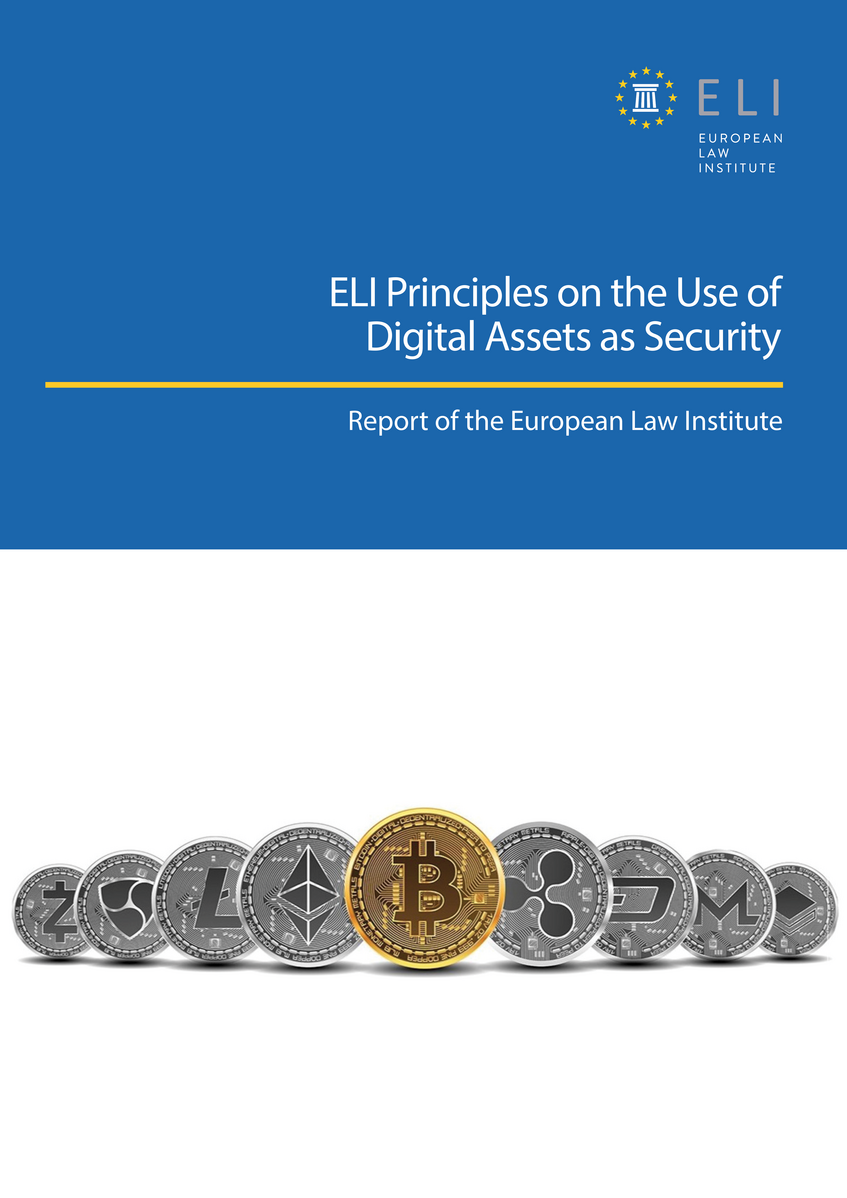ELI Principles on the Use of Digital Assets as Security
Quick Facts
Project Type: Principles (first installment of the ELI project on Access to Digital Assets)
Procedure: Regular
Adopted: CD 2019/4 on Projects (Approval of a New Project on Access to Digital Assets)
Project Period: March 2019–February 2022
Events
An overview of past and upcoming events of this project is available here.
Translations
The following version is available: Turkish.
Summary
The ELI Principles, which were produced as part of the ELI Project on Access to Digital Assets, seek to provide guidance to private parties, whether natural or legal, contemplating the use of digital assets as security.
Background
Despite the fact that digital assets only account, at present, for a very small share of most private individuals’ asset portfolios, their popularity is on the rise. Digital assets cover a wide variety of assets, such as crypto-currencies, stablecoins, social media profiles and online gaming accounts; whilst there is no comprehensive definition at present, guidance is desirable, inter alia on their use as security.
Aim
The ELI Principles, which were produced as part of the ELI Project on Access to Digital Assets, seek to provide guidance to private parties, whether natural or legal, contemplating the use of digital assets as security.
Outcome
The ELI Principles seek to provide this guidance by setting out key concepts relevant to the use of digital assets as security. In particular, the Principles focus on situations where security providers secure the performance of their obligations vis-à-vis security takers by using digital assets as collateral under the terms of a security agreement.
The Principles also propose ways to identify the law applicable to the creation of security interests in digital assets, and address issues of relevance to the effectiveness of security interests in digital assets against third parties, as well as the enforcement and extinction of security interests in digital assets.
They provide a source of inspiration and guidance for the further development of case law, legislation and soft law instruments in the field of digital assets by courts, national legislatures and international organisations. The Principles can also be used by judicial enforcement officers, public authorities, (civil law) notaries and commercial arbitrators faced with issues relating to access to digital assets.
Drafters of the ELI Principles on the Use of Digital Assets as Security
- Phoebus Athanassiou
- Teemu Juutilainen
- Denis Philippe
Project Reporters
- Sjef van Erp
- Jos Uitdehaag
Other Project Team Members
- Wian Erlank
- Sabine Heijning
- Paul Matthews
- Thomas Meyer
- Christopher Mondschein
- Gabriele Della Morte
- Chris Odinet
- Radim Polčák
- Albert Ruda
- Teresa Touriñán
Advisory Committee Members
- Suzanne Brown Walsh
- Sergio Cámara Lapuente
- José Antonio Castillo Parrilla
- Richard Frimston
- José Llopis Benlloch
- Peter Lown
- Donna Molzan
- Reiner Schulze (Assessor)
- Christiane Wendehorst (Assessor; until November 2021)
- Aneta Wiewiórowska-Domagalska (Assessor)
Members Consultative Committee
- Jason Allen
- Austrian Chamber of Civil Law Notaries (represented by Stephan Matyk-d'Anjony)
- Arvind Babajee
- Curia of Hungary (represented by Mónika Gáspár; until June 2021)
- Moustapha Ebaid
- European Law Students' Association Austria (represented by Anh Nguyen)
- European Union of Judges in Commercial Matters (represented by Rainer Sedelmayer)
- Karen Lynch Shally
- Lineke Minkjan
- Dimitrios Moustakatos
- Cécile Sainte-Cluque
- School of Law, University of Hull (represented by Gonzalo Vilalta Puig)
- Society of Trust and Estate Practitioners (represented by Leigh Sagar)
- Ferenc Szilágyi
- Aura Esther Vilalta Nicuesa
- University of Latvia (represented by Vadims Mantrovs)
-
Western University 'Vasile Goldis' Arad - Romania, Faculty of Law (represented by Christian Alunaru)
Observers
- European Commission (represented by Maria Vilar Badia and Veronica Williams)
- Spanish Land Registrars (represented by Silvino Navarro)

